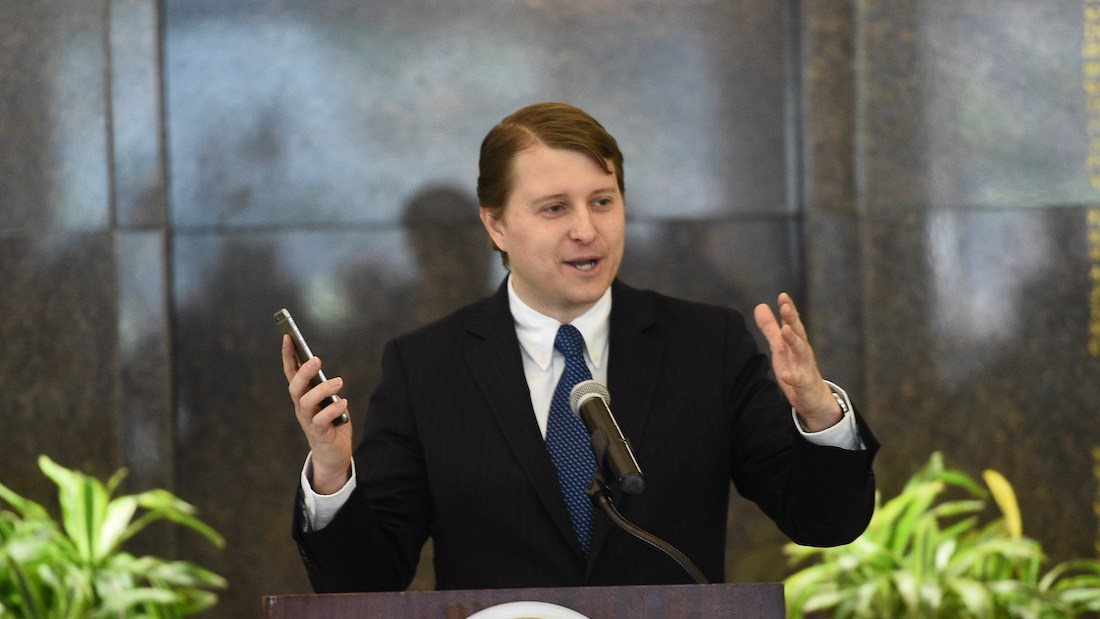
TV Show
22:48, 27-Feb-2019
Richard Nixon's grandson optimistic of the China-U.S. trade talks
Updated
21:20, 01-Mar-2019
Global Business
03:40

China and the United States will work out the best deal for the trade talks as the two countries have mutual interests, and China's financial service industry will be a new driver of economic growth, according to Christopher Nixon Cox, Vice Chairman for Asia, Middle East and Public Policy at BrightSphere Investment Group (BSIG).
Cox on the economy
“When China and the United States have mutual interests, our relationship tends to work out the best,” Cox told CGTN.
Cox is the grandson of the late U.S. president Richard Nixon. He grew up with a lot of China experience and has had discussions in the past with Trump administration officials on China-U.S. relations.
“The president is a dealmaker and he wants to make a deal,” he said. As to trade tensions between the two largest economies in the world, he was trying to "look beyond the horizon line," instead of "looking at a snapshot of a relationship at this moment.”

www.nixonfoundation.org Photo.
www.nixonfoundation.org Photo.
“When you look at the relationship as it is today, there will always be tensions……We're now getting issues out on the table that we want to discuss. And whenever you put issues out, we can have differences. There will be some negativity, but I think that's healthy. I think it's healthy to have an honest discussion. And I think that's what we're having right now,” he addressed.
And he thought that since the two countries have mutual interests in “strengthening the world economy and strengthening the economy of our two countries,” the final agreement would reach the mutually beneficial for both sides.
“I think both policymakers in the U.S. and in China will put in a lot of hard work. There will be some frustrating moments, but we'll get through this time. And our solution will ultimately be good for both countries,” he stressed.
Cox on business in China

VCG Photo
VCG Photo
The BSIG, as a global, diversified multi-boutique asset management company, has 206.3 billion U.S. dollars in assets under management (AUM) as of the end of 2018. Based on its most recent earnings report, the high-growth markets in the Asia-Pacific region, account for about five percent of total AUM last year.
Cox explained that the “emerging and wealthy” middle class in China needs asset management, while companies here are looking for “sophisticated asset managers” to help manage their financial products.
“So we think we can someday fill that gap. And we think that's a great area for investment,” he said. Cox also mentioned that the company has felt welcomed by the Chinese government and companies.
Regulators have indicated that they are very eager to have U.S. businesses come to China. "I feel that China is a great part of our future,” said Cox.
“And we really believe these partnerships will be a great symbol of Chinese and American cooperation and a great example of how two great countries can work together,” he said.
Cox on the bilateral relationship

VCG Photo
VCG Photo
“The Sino-U.S. relationship will be the most important relationship between two countries for the 21 century. So when you're really talking about the China-U.S. relationship, you're talking about the health of the world system, economic system, the geopolitical system,” Cox indicated.
“Many American families say to their children ‘you need to learn Chinese.' Schools are now offering Chinese as a second language to American students……There are many Chinese students who come to the U.S. to learn,” said Cox.
Cox expected more people exchanges between the two countries, which may clear up misunderstandings. Moreover, he highlighted the Belt and Road Initiative, noting that “this is a very innovative program. And I would say that it's important that the United States and China work together to make sure that the aid and assistance are being given out, is being administrative efficiently and is going to the right projects.”
He continued to say, “the more interaction we can have, so we can learn more about each other. That pushes the idea of an inevitable conflict to be back of our mind…… And I think the policymakers at all levels should be thinking how can we cooperate? How can we work together and how can we come up with a win-win situation for both?”
(If you want to contribute and have specific expertise, please contact us at opinions@cgtn.com.)

SITEMAP
Copyright © 2018 CGTN. Beijing ICP prepared NO.16065310-3
Copyright © 2018 CGTN. Beijing ICP prepared NO.16065310-3